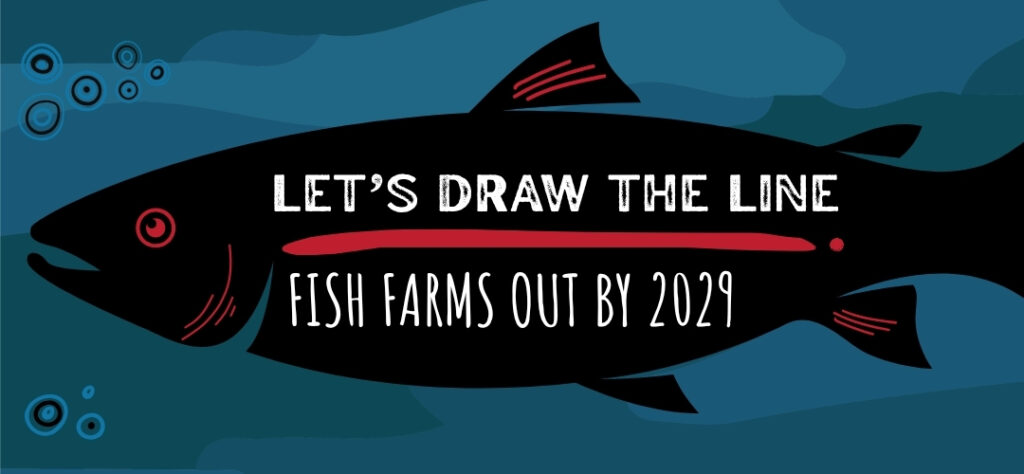
A delayed promise
The year of 2019 was monumental as the Federal Government committed to removing all open-net fish farms out of BC’s coastal waters by 2025. However, the commitment has since been delayed — endangering the iconic and irreplaceable populations of wild salmon and everything they sustain with each passing year.
Threats from fish farms, like pollution and pathogens, have caused a concerning decline in wild fish populations in recent years, which also negatively impacts the endangered Southern Resident killer whales, bears, eagles, and over 100 other species. This has ripple effects on coastal livelihoods and Indigenous traditions, ceremony, and food practices that have sustained communities for time immemorial. This is a good example of how interconnected ecologies are, and how strategic interventions in one area can provide high-impact value to the whole system.
Losing wild salmon would mean species extinction, but it also means a social, ecological and cultural crisis.
With a deadline to remove open-net pens, a transition plan with clear inadequacies and no further understanding of how and when this deadline will be met, the Government needs to be held accountable to their commitment.
Here’s what we ask:
- Set a clear deadline: declare a clear and unwavering deadline for the removal of all open-net pen fish farms in BC waters by 2029 or earlier
- Share the path to success: share a transparent and clear plan for when and how this removal will be achieved
- Define closed-containment: publish a statement that makes it clear that in-water closed containment technologies will not be considered, as these technologies do not exist. Further, semi-closed or hybrid technologies will not be permitted after the set deadline. Closed containment land-based systems are the only way forward.
- Ensure a just transition: prioritize a just aquaculture transition plan to support workers and communities impacted by the transition and encourage economic diversification and job creation in related industries — to (re)build a resilient coastal community means taking care of both the people and the ecosystems that sustain them.

How we got here
GSA has been involved in issues pertinent to salmon farms since 1997, and was an active participant in the Cohen Commission, both as an organization and also a member of the Coastal Alliance for Aquaculture Reform (CAAR) in 2012. Since then, there have been advancements, comprising of victories and defeats along the way. Here’s a timeline of the major events that have occurred through the decades.
Why this action is needed
Protecting wild salmon means protecting the future of our coast. This keystone species plays a critical role in maintaining the health of the ecosystem and nutrient cycling from marine environments to upstream rivers and forests—fueling lifecycles wherever they go. They are the main food source for the endangered Southern Resident killer whales, but also serve as prey to birds, bears, wolves, and other wildlife.
However, closing open-net fish farms is not just an environmental imperative—it’s a smart investment in a BC conservation-based economy. Healthy wild salmon populations are the backbone of countless local economies, from sustainable fisheries to Indigenous food systems, ecotourism, and coastal stewardship jobs. By phasing out harmful aquaculture practices, we create space for more resilient, community-led economic models that prioritize ecosystem health and long-term prosperity.
Protecting salmon is about more than saving a species—it’s about building a future where economic well-being and environmental justice go hand in hand. This is the perfect opportunity for Canada to honour its commitments and reinstate the faith British Columbians have shown towards its governance—a moment for bold, just, and determined action to protect the economy and food sovereignty of British Columbia.
